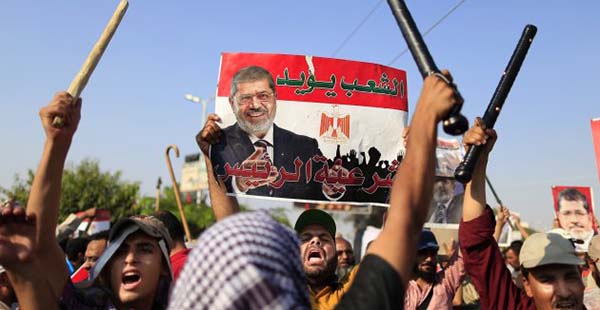The dawn of August 14 changed many calculation in the power balance in the region when police force swooped on two sit in camps raised by opposition of interim military government. In spite of eruption of clashes and intensification of violence, police force turned the wheel towards two camps with helicopters hovering over their heads. They were backed by bulldozers moved on two huge protest camps set up in Cairo by supporters. The operation began shortly after dawn when security forces surrounded the sprawling Rabaa Al Adawiya camp in east Cairo and a similar one at Al Nahda square, in the center of the capital.
Witnesses said police rained canisters of tear gas down onto tents before entering Rabaa Al Adawiya, sparking uproar among the thousands of protesters. Clashes quickly erupted between protesters and security forces on one side of the camp, as automatic fire was audible. But what later on appeared televised an overt violent measures of the government against protestors. Television footage showed injured people being carried to a makeshift medical center as well as police dragging away protesters, who have defied numerous ultimatums to end their demonstrations. Based on allegation of oppositions, more then 600 people were killed in clashes with security forces and more than three thousand people injured just within two days after swoop of security forces which have sparked huge criticisms around the world. Even recently, Turkey which deemed the Islamist government as its close ally claimed that foreign hands were behind the oust of President Morsi.
Seemingly, in spite of warnings of the army and fear about the persecution of Muslim Brotherhood leaders who are blamed of inciting the flames of antagonism in the country, their supporters have decided to stand against the authority. These steps are certainly fearsome and have the potential to intensify and prolong violence and uncertainty in the country.
There are several issues that should be noticed by all wings. Both the Islamists and oppositions of constituted from far left to the far right, are trying to make the gap large and larger instead of trying to bridge and work for an acceptable establishment. Sincerely, I really doubt that if today pro-Morsi protestors stop demonstrations and leave the current military government continue up to the next presidential election, the present government succeed to restore stability and relieve civilians. Because if the current demonstrations lose its political veil, soon after the economic instability will appear. Presently, the pro-Morsi political demonstrations have somehow undermined the deep down discontent of civilians. We should not forget that President Morsi was an elected president and millions casted their votes in his favor. Even if we consider the height of demonstration against the military de facto government, again we obviously see that the Brotherhood party has lost huge part of its ground supporters.
It looks naïve to consider that present few thousand demonstrators are the representatives of the millions of people voted for President Morsi. So, what is wrong? Were oppositions really so strong to mount pressure and incite such a nationwide anger against the Islamist leader and the Muslim Brotherhood? A positive answer to this question should be doubted.
What made the military to reach to a conclusion to terminate a yearlong life of the presidency of Mohammad Morsi was nationwide opposition to his government, at least it was pretended so. Military intervened when Al-Cairo streets become the TV channels of public opinion against government. If the public anger did not hit the height, military would not have found the chance to interfere and oust civilian government.
The series of demonstration across the country showed that Islamist government actually has lost huge part of its supporters not because of its Islamist agenda, because it could not meet its promises regarding the economic prosperity. Progressive instability severely dealt blow to one of the main source of public revenue, tourism.
Similarly, other economic activities shut down or decreased tremendously due to continuous instability. This process in turned dragged people back to Tahrir square perhaps majority of them had ideological link to right, left or the center. Their problem was lack of employment and inflation not actually modern values. Deep down in their heart, they were asking for employment not for establishment of secular government. They were angry due to high inflation not because President Morsi put the constitution on referendum.
Part of the problem lied on the bed of foreign policy of Morsi’s government that could not attract the attention of wealthy Arab countries. If he could made a better relation, say for instance, with Saudi Arabia which has never had a friendly relation with the Brotherhood or did not show any tilt toward Islamists agenda that would eventually persuaded western countries to support his government. Perhaps he could continue as President. The economic problem turned severe as many Arab countries who opposed ex President Mr. Mobarak avoided pouring money into the country to relieve Egyptians.
Thus, the current rulers should learn from the past. They should understand that cracking down the pro-Morsi will not get them rid of public anger, even if they succeed in doing so. Oppositions also accept the reality that Mr. President will not restored. Emphasizing on doing so will only increase bloodletting in the country. Thus, the best way is to negotiate and develop friendly relation with regional and global countries in order to receive their fund till the economic cycle moves back on the track.

